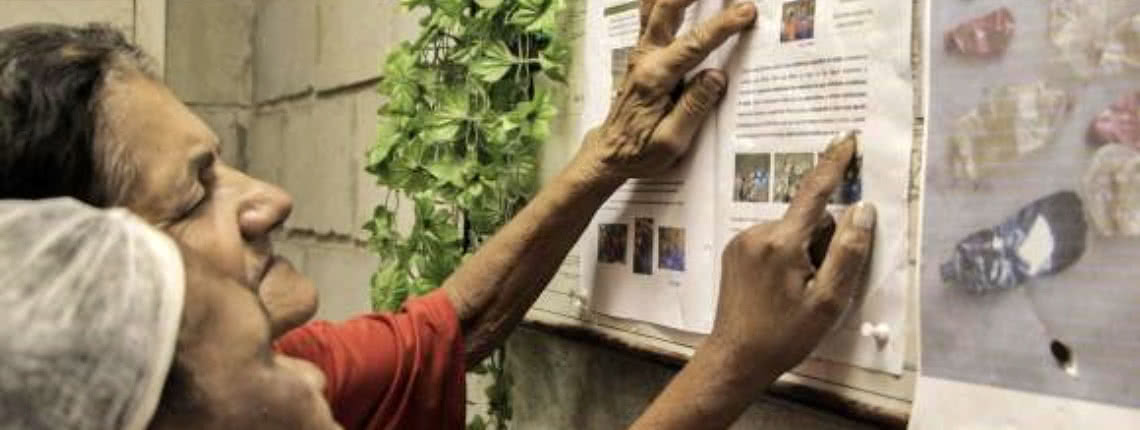
Waste pickers may keep cities clean, but they face hazardous conditions on the job. Their health and wellbeing is at risk on a daily basis. As they collect and sort urban waste, they are exposed to dangerous materials and workplace conditions, among other issues.
Earlier this year, WIEGO launched the Cuidar Project, a joint initiative with Redesol, a second-level network of waste picker cooperatives in Belo Horizonte, Brazil. The Cuidar Project aimed to collect information on health risks waste pickers face. It also sought to understand workers’ coping strategies and access to public health services.
The health risk mapping considered how workplace environments, infrastructure and organizational processes affect workers’ physical and emotional health.
The project took place in five cooperatives belonging to Redesol: Comarp (Belo Horizonte, Minas Gerais), Associrecicle (Belo Horizonte, Minas Gerais), Ascar (Raposos, Minas Gerais), Coopersoli (Belo Horizonte Minas Gerais), and Unicicla (Nova União, Minas Gerais).
The health risk mapping considered how workplace environments, infrastructure and organizational processes affect workers’ physical and emotional health. The term “workers’ health” signals the adoption of a comprehensive approach to health, which incorporates multiple dimensions of the workplace and work processes.
In this Q&A, we talk with Sonia Dias (SD), WIEGO’s waste sector specialist, and Ana Carolina Ogando (AO), a research associate at WIEGO, about how the project got started, why it’s important to better understand waste pickers’ health risks, and what steps can be taken to improve their conditions.
Read more about informal workers’ health.
This sounds like an important initiative for waste pickers, in particular, given the nature of their work. What prompted this project?
SD: The Cuidar Project emerged as a demand from the membership-based organizations (MBOs) and waste picker leaders who wanted to systematize current information on health concerns and risks within cooperatives.
More specifically, discussions on waste pickers’ health came about in an annual meeting held by Redesol in 2016. One of the working groups at the event made the claim for emphasizing the theme in the networks 2017 agenda with partners and stakeholders. Interestingly enough, the link between health concerns and working conditions had already appeared in other WIEGO action and participatory action research with waste picker cooperatives in Belo Horizonte, such as the Informal Economy Monitoring Study and the Gender and Waste Project.
As a result of these interests, WIEGO’s Social Protection Programme and Urban Policies Programme supported our efforts to design a participatory project that would speak to Redesol’s interest in collecting more information on health.
... we value waste pickers’ input at every stage of the research process ...
AO: I think that the interest in the project came at a moment where WIEGO and our local MBOs respectfully engaged in a collaborative process that would produce useful data for the cooperatives and raise visibility on multiple dimensions of waste pickers’ workplace conditions, productivity and resilience. In fact, Ivaneide Souza, Redesol’s president, claimed that the project was relevant because it offered waste pickers the opportunity to reflect on “how they have been taking care of their bodies while at work and reconsidering what is needed to improve their health” (Encare Feedback Event, August 25th, 2018).
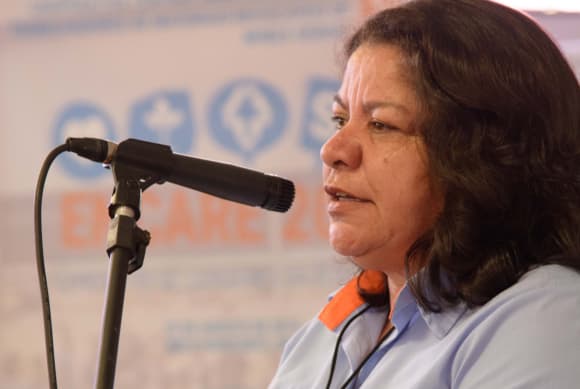
2) You mention that the process of designing the project was participatory. Could you talk more about this and why it was important?
AO: Much of the work we do to generate knowledge for and with the waste pickers is anchored in the principles of popular education and participatory processes. In this sense, we value waste pickers’ input at every stage of the research process, including feedback on defining key research questions and methods, the pace of the research process itself and even on validating the data produced by the researchers.
Read more on Cuidar’s validation and feedback event.
SD: Prioritizing waste pickers’ voices in the process and recognizing them as co-producers of knowledge helped to further strengthen our relationship with Redesol. Even more so, it allowed us as to work towards the production of knowledge that would be useful for Redesol in their claims-making processes and for broadening their relationships with other important local stakeholders.
“We need data and the Cuidar Project is a tool for us."
I think this resonates with the trust-based relationship we have developed over the years with Redesol. Marli Beraldo, vice-president of the network, reinforced how strategic the project is for Redesol. At the feedback event she stressed: “We need data and the Cuidar Project is a tool for us. Redesol’s management committee was a part of the discussions of the project. We worked collaboratively with WIEGO on it, and now we can share concrete results with the network” (Encare Feedback Event, 25 August 2018).
AO: I also think a key dimension and strength of this bottom-up participatory approach is that it was able to capture the individual and collective strategies waste pickers rely on to mitigate health risks. From the beginning of the process, we knew we didn’t want to focus strictly on the vulnerabilities waste pickers face in their cooperatives. This meant recognizing that waste pickers have important insights not only into the challenges they are facing, but also into the solutions that may be needed for tackling them.
Overall, I would say waste pickers were quite receptive to discussing health concerns and risks. The preparation of the different tools, based on popular education methods, allowed us to quickly build rapport within the cooperatives, greatly facilitating fieldwork. We would often hear that the activities reminded waste pickers to be more conscious of the impacts of their heavy work routines on their bodies, but also that being able to share concerns was in fact therapeutic.
The diverse composition of our team reflected our desire to have an interdisciplinary lens when heading to fieldwork.
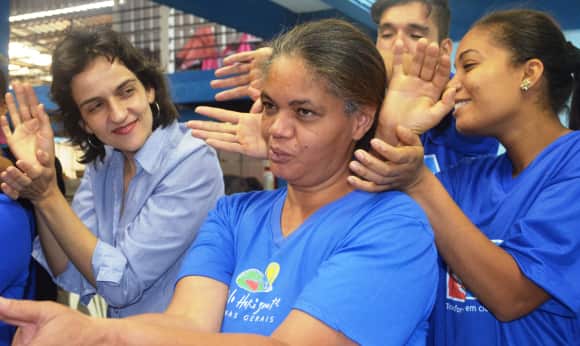
SD: In addition to the collaborative process with the waste pickers and leaders of Redesol, we also relied on the support of two other researchers, Juliana Gonçalves and Fabiana Goulart, who have been working with the waste sector for several years in the field of engineering and psychology, respectfully. The diverse composition of our team reflected our desire to have an interdisciplinary lens when heading to fieldwork. This is also why we sought ad hoc advice from researchers affiliated with important national health research centres in Brazil.
3) What were some of the main findings? Did any of the health risks surprise you? Did they surprise the waste pickers themselves?
SD: One of the key findings for me was to see how waste pickers are coping with risks, often in creative ways. Some cooperatives have been focusing on improving their nutrition, while others have been focusing on minimizing their body pains with exercise routines.
I think our role was to try to have the waste pickers reflect on how powerful it would be to have the cooperative embrace these strategies on a more collective basis.
Some cooperatives have been focusing on improving their nutrition, while others have been focusing on minimizing their body pains with exercise routines.
AO: I think for me one of the main findings has to do with how comprehensively waste pickers defined different aspects of workers’ health. There was a very clear understanding from their perspective that having good health is just as much about physical wellbeing as it is about emotional wellbeing. The latter was emphasized in all activities during fieldwork and reinforces studies that have looked at how common mental disorders, such as fatigue, anxiety and depression, are related to socio-economic and gender vulnerabilities.
It was also surprising to see how concerned waste pickers are with non-communicative diseases, such as diabetes and hypertension. Overall, waste pickers were stressing that their health is linked to work routines, inadequate infrastructure and equipment and work relations.
... physical wellbeing as it is about emotional wellbeing.
SD: I think it’s also worth mentioning what our research staff pinpointed as key findings. Juliana Gonçalves was surprised by how much the survey body maps helped show the precarious work conditions that exist in the waste-picking sector. For Fabiana Goulart one of the most interesting aspects of the fieldwork was giving voice to leaders: “It was an insightful moment to see how leaders construct their ways of knowing and become managers”. For her, the process of becoming a leader is directly influenced by the relationship with the cooperative members and the leader’s own personal story and experiences.
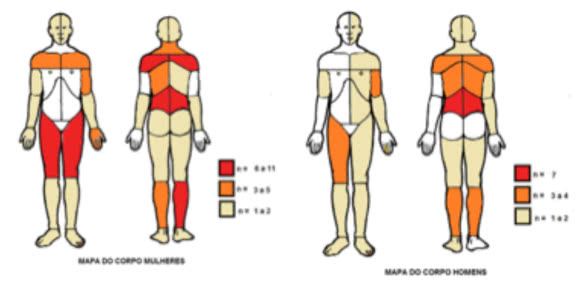
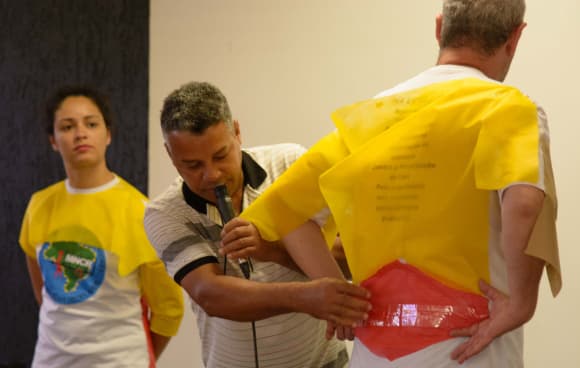
Watch this video on the role of waste pickers in urban recycling.
4) Part of the project was about testing out different communication feedback loops to raise awareness of work-related health issues. What kinds of media did you experiment with and did some mechanisms work better than others?
SD: We were always very concerned about how information about the project was reaching the MBO bases, and most importantly, being used by them. We wanted to be very conscious about how the discussions on health could reach waste pickers who weren’t necessarily participating in the fieldwork activities but could still encourage reflections on their own health and practices within the cooperatives.
One of the tools I particularly like to use is short videos with waste pickers. During our visits to cooperatives, I would record short videos before and after activities with waste pickers and share these reflections with Redesol.
We were always very concerned about how information about the project was reaching the MBO bases, and most importantly, being used by them.
AO: We also knew that it was important to have visual materials where waste pickers would feel recognized and respected for the time they spent in our activities. We would often draft short photo reports in between fieldwork activities to remind waste pickers of previous discussions.
I think they really appreciated this feedback and enjoyed not only seeing pictures of themselves, but reading quotes about what colleagues were saying about their health concerns. We also produced photo quote cards with suggestions from waste pickers on the importance of nutrition, using protective gear and having the community fully embrace inclusive recycling.
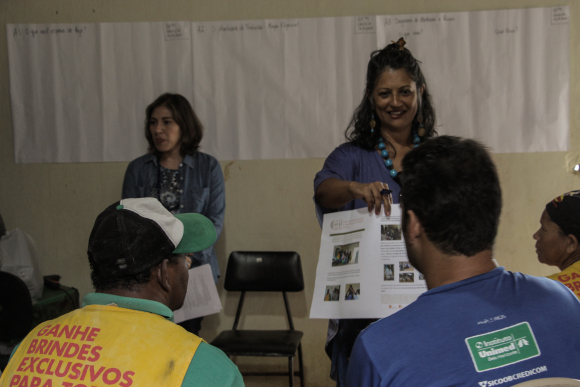
5) Where do you see this project going next both on the grassroots level of understanding health needs and connecting these findings on a policy level?
AO: At the grassroots level, I would say the project raised awareness on what waste pickers can do on a daily basis to create a healthier and more cooperative work environment. Waste pickers repeatedly mentioned the need for changing attitudes and habits within the cooperative, some of which involve adopting better hygiene at the workplace and more respect and tolerance for their colleagues.
At the policy level, the project also reinforced the key role governments and stakeholders, including civil society, play in committing themselves to more inclusive selective waste collection policies. The health risks waste pickers face can decrease if there is greater attention given to improving working conditions, infrastructure and quality of recyclable materials that arrive at the cooperatives. This ultimately involves better planning with and for waste pickers for their sorting warehouses and consistent mobilization strategies that show the importance of recycling, not only for these workers' livelihoods, but also for the environment.
SD: Bringing to light the connections between decent work and informal workers' health issues is also essential to the discussion of who can address important sustainable development goals -- and how they should be addressed -- particularly issues of decent work and economic growth (SDG 8), gender equality (SDG 5) and sustainable cities (SDG 11).
I think one of the key developments of the project are the links being made with two networks focused on workers´ health. One is the Salud urbana en América Latina (SALURBAL) network, which was formed by 10 Latin American and US-based research institutions. SALURBAL is a policy-oriented network interested in understanding regional urban policymaking frames and engaging with health, evaluating impacts of specific policies, and fostering good practices. We are happy to be opening up space to discuss informal workers’ health issues within this network.
At the grassroots level, I would say the project raised awareness on what waste pickers can do on a daily basis to create a healthier and more cooperative work environment.
The other network is the Workplace Health Without Borders (WHWB), which is composed of a group of occupational hygienists who came together to fund a not-for-profit organization. This group seeks to address occupational health and safety issues around the world.
WHWB created a new working group called “waste workers’ health”, and WIEGO has just been invited to join. This group is seeking to establish joint collaborations focused on research and research-action projects to help raise the visibility of formal and informal waste workers´ health.
In addition, we hope we can strengthen collaboration with the two Brazilian foundations that sat on our advisory committee, FUNED and FIOCRUZ, to expand our knowledge about waste pickers’ health.
Read more about the Cuidar Project and waste pickers’ health.
Para ler este artigo em português, veja aqui.
Feature photo: Waste pickers review what colleagues stated about health concerns in the photo news report. Photo: B. Greco
Related Posts
-
Informal Economy Theme
-
Informal Economy Topic
-
Occupational group
-
Region
-
Language
